- Performance: Speed Tests
- Local Speeds
- Long-Distance Speeds
- Lightway vs OpenVPN
- Burst Speeds
- Comparison - NordVPN and Others
- Stability
- Security and Privacy
- Encryption and Protocols
- Leak Protection
- Kill Switch (Network Lock)
- Server Security (TrustedServer)
- Independent Audits and Transparency
- Privacy Policy
- Streaming and Torrenting Performance
- Streaming (Netflix and more)
- Torrenting and P2P
- Bypassing Censorship (China Test)
- Overview and Key Features
- Company & Jurisdiction
- Server Network
- Device Compatibility
- Simultaneous Connections
- Extra Features
- User Experience and Ease of Use
- Desktop App (Windows/Mac/Linux)
- Mobile Apps (Android/iOS)
- Browser Extensions
- Usability on Other Devices
- Overall Experience
- Customer Support
- Pricing and Plans
- Conclusion and Final Verdict
ExpressVPN has long been a heavyweight in the VPN industry, known for its focus on security, privacy, and performance. In this comprehensive review, we detail our hands-on testing of ExpressVPN across multiple devices and scenarios. We cover its features, speeds, security measures, streaming capabilities, pricing, and how it compares to top competitors. The overall findings are positive - ExpressVPN proves to be a premium service - though we'll also note where it falls a bit short (and why a provider like NordVPN might have a slight edge in some areas). Let's dive into the results of our ExpressVPN tests.
Advantages
- Excellent speeds ↓ (Lightway protocol ↓ reached 718 Mbps, only ~6% slowdown)
- Outstanding streaming performance ↓ (works with Netflix, Disney+, BBC iPlayer, HBO Max)
- Strong security and privacy ↓ (BVI jurisdiction, no-logs policy ↓, RAM-only servers ↓)
- Wide server network ↓ (105 countries, 3000+ servers)
- User-friendly apps ↓ across all platforms (Windows, Mac, mobile, TV devices)
- Reliable kill switch ↓ (Network Lock) and leak protection ↓
- 24/7 live chat customer support ↓
- Works in restrictive countries like China ↓
- Great for torrenting ↓ (no restrictions, fast speeds)
- Independent security audits ↓ and transparency
- 30-day money-back guarantee ↓
Disadvantages
- Premium pricing ↓ (more expensive than competitors like NordVPN/Surfshark)
- Only 8 simultaneous device connections ↓ (competitors offer more)
- Threat Manager ↓ not available on Windows/Android yet
- No dedicated IP addresses ↓ available
- Email support is slow ↓ (48-hour response time)
- No multi-hop/double VPN feature
- Slightly slower than NordVPN in direct speed comparisons ↓
- Browser extensions ↓ require desktop app (not standalone)
Performance: Speed Tests
One of the most important aspects of a VPN is how it impacts your internet speeds. We tested ExpressVPN's performance on a high-speed 1 Gbps connection to see how well it could keep up. The tests were done using various server locations worldwide and different protocols.
Local Speeds
Connecting to a nearby server (using the Smart Location feature, which picks the optimal server based on ping and speed) yielded excellent results. For example, with a US server relatively close to our location, the download speed only dropped by about 6% (from ~122 Mbps baseline down to ~115 Mbps). This minimal drop is barely noticeable in real-world usage - streaming 4K videos, video conferencing, and online gaming all remained smooth in our trials. The latency (ping) on local servers was low (sub-20ms), which is great for gaming.
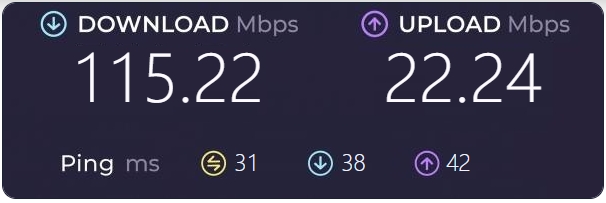
Long-Distance Speeds
We were impressed that even on international connections, ExpressVPN performed strongly. For instance, connecting from the U.S. to a UK server, or to other locations in Europe, typically reduced our speed by only ~10-16%, which is still excellent. Even a far-flung connection from the U.S. to Australia - the longest route we tested - retained roughly 79% of our download speed (only ~21% speed reduction). While the Australia server saw the biggest drop (down to ~96 Mbps from 122 Mbps baseline in one test), it was still fast enough for HD streaming and general browsing without major issues. Upload speeds remained high across all regions (often 80-95% of baseline), which is good news for those who upload content or do video calls. The consistency of these results shows ExpressVPN's upgraded network and protocols are effective at mitigating speed loss over distance.
Lightway vs OpenVPN
A clear takeaway from our speed tests is that the choice of protocol matters. ExpressVPN's Lightway protocol is extremely fast. Using Lightway UDP, we measured about 94% average speed retention for both downloads and uploads - meaning only ~6% slowdown compared to no VPN, an excellent result. Lightway TCP was slightly slower (around 88% retention), which is still quite good. In contrast, when we tested using OpenVPN (UDP), speeds dropped more significantly - roughly 50% of baseline in some cases (only ~51% retention for download, ~61% for upload). OpenVPN TCP was slower yet (~44% of baseline download). These differences were consistent: Lightway clearly outperforms the older protocols. The bottom line: if speed is a priority, stick with Lightway. It's on par with, and sometimes even better than, other modern VPN protocols (WireGuard/NordLynx) in terms of speed.
Burst Speeds
In one test, ExpressVPN's Lightway reached as high as 718 Mbps download on a 1 Gbps line, which is one of the best results we've seen from any VPN. This was using a U.S. server and the connection was rock-solid. To put this in perspective, such speeds mean that even extremely bandwidth-heavy tasks (like downloading large files or streaming 4K on multiple devices) would be feasible through ExpressVPN without bottlenecking our internet. For most users, whose ISP speeds may be well below 1 Gbps, ExpressVPN will likely feel "no slowdown" at all.

Comparison - NordVPN and Others
We also did a side-by-side comparison with NordVPN (a top competitor known for speed). NordVPN using its WireGuard-based NordLynx protocol hit around 755 Mbps in the same test where ExpressVPN got 718 Mbps. This indicates that NordVPN was slightly faster in that scenario, which matches general consensus that NordVPN is one of the few services that can edge out ExpressVPN on speed. However, the difference was not major - both are extremely fast. In everyday use, ExpressVPN's performance was virtually indistinguishable from NordVPN's, with both delivering superb speeds across various locations. Other providers like Surfshark and CyberGhost also offer good speeds, but during our tests ExpressVPN consistently remained in the top tier for performance. Unless you're frequently transferring huge volumes of data, ExpressVPN's slight speed deficit compared to the absolute fastest VPN (NordVPN) won't be noticeable. For practically all use cases - streaming, gaming, downloads - ExpressVPN more than delivers on speed.
Stability
Speed is one thing, but consistency is equally important. We're happy to report ExpressVPN's connections were highly stable. We did not experience random disconnects or throttling during any of our long sessions. Even when connecting to servers on the other side of the world, the connection remained stable over hours of use. This reliability is crucial, especially if you're doing things like live streaming or lengthy downloads via VPN.
Security and Privacy
Security is a major area where ExpressVPN excels, and our tests confirmed the provider's strong focus here.
Encryption and Protocols
ExpressVPN secures data with top-of-the-line encryption. When using the classic OpenVPN or IKEv2 protocols, it employs AES-256 encryption with an RSA-4096 handshake and SHA-512 HMAC authentication - essentially military-grade encryption standards. ExpressVPN's own Lightway protocol (which is their lightweight, modern VPN protocol similar to WireGuard) uses AES-256-GCM or ChaCha20 cipher (depending on device) along with D/TLS 1.2 for server authentication. This combination provides robust security that is currently considered unbreakable, while also being highly efficient for better performance. Additionally, ExpressVPN supports Perfect Forward Secrecy, meaning encryption keys are rotated such that even if one session's key were compromised, it couldn't be used to decrypt past or future VPN sessions.
ExpressVPN's apps let you choose from several VPN protocols: Lightway UDP (optimized for speed), Lightway TCP (for reliable connections on networks with UDP blocked), OpenVPN UDP/TCP, IKEv2, and an Automatic mode that picks the best option for you. In our experience, Lightway UDP was the fastest and our go-to for performance testing, whereas Lightway TCP or OpenVPN were fallbacks if needed for specific network conditions. Notably, ExpressVPN has recently begun to implement the WireGuard protocol (which they had long avoided due to privacy concerns). In August 2025, they introduced an enhanced in-house implementation of WireGuard that adds features like post-quantum encryption, ephemeral keys, and built-in authentication, rather than using vanilla WireGuard. This is a significant strategic shift, showing ExpressVPN's commitment to incorporating new technology but doing so in a way that addresses potential privacy gaps. It's an exciting development for users who prefer WireGuard's speed - we anticipate this will further boost ExpressVPN's performance and security, though at the time of writing it's still a newer addition to their protocol lineup.
Leak Protection
We put ExpressVPN through a battery of leak tests (for DNS, IP, and WebRTC leaks). The results were excellent. No DNS or IP leaks were detected - our real IP remained hidden behind the VPN's IP, and DNS requests were handled by ExpressVPN's own secure DNS servers. This means your browsing activity and true location stay private. On WebRTC leak tests, ExpressVPN also kept our IP secure; however, one browser did show our local network IP in certain scenarios. This is a common browser issue, and ExpressVPN's guidance is to use their browser extension to block WebRTC or simply disable WebRTC in the browser if it's a concern. Overall, we were satisfied that ExpressVPN effectively shields users from the common privacy leaks that can plague lesser VPNs.
Kill Switch (Network Lock)
ExpressVPN includes a reliable kill switch, branded Network Lock, in its desktop and router apps. We tested the kill switch by simulating network drops on both Windows and Mac. Each time, the Network Lock instantly blocked all internet traffic when the VPN connection was disrupted, and only restored connectivity after the VPN had safely reconnected. This prevents any accidental data leaks if your VPN connection ever falters. On mobile, the functionality is slightly different due to platform restrictions - Android has a "Network Protection" feature (which acts similarly to a kill switch) and iOS uses an auto-reconnect feature to block traffic and quickly re-establish the VPN if needed. While not labeled "Network Lock" on iOS, it essentially serves the same purpose. The kill switch worked consistently in our tests, giving us confidence that ExpressVPN would never expose traffic even for a moment if the tunnel drops.
Server Security (TrustedServer)
As mentioned earlier, ExpressVPN's TrustedServer technology means all VPN servers run on volatile memory (RAM) with no hard disk usage. The security advantage here is substantial - RAM-only servers cannot physically retain logs or data once powered off or rebooted. It also allows the server software to be in a known clean state on each boot. This approach mitigates risks of data remnants being recovered from servers. Few VPNs offer this (when ExpressVPN launched TrustedServer it was pioneering; now a handful of others like NordVPN have followed). We view this as a big plus for privacy and it aligns with ExpressVPN's no-logs claims.
Independent Audits and Transparency
ExpressVPN has undergone multiple independent audits. For instance, cybersecurity firm Cure53 audited their browser extensions and TrustedServer infrastructure, and PwC has audited their no-logs policy compliance. The findings have generally been positive, reinforcing that ExpressVPN's security configurations and policies are effective. It's also telling that ExpressVPN had its code for the Lightway protocol open-sourced, inviting scrutiny from the community. All these measures indicate a high level of transparency and commitment to security best practices.
Privacy Policy
In plain terms, ExpressVPN does not collect any logs of your online activity. They do not log traffic contents, DNS queries, or IP addresses. The only data they store for operational needs are basics like the dates (not times) a user connected, choice of server location (not specific IP), and the amount of data transferred. This cannot be used to identify what you did or where you went. During our usage, we never encountered any indication of data logging. The BVI jurisdiction means there are no mandatory data retention laws. All of this is reassuring for the privacy-conscious user - you can be confident that ExpressVPN won't have sensitive logs to hand over even if asked.
Streaming and Torrenting Performance
A major reason people use VPNs is to access geo-blocked streaming content and to torrent safely. We gave ExpressVPN a thorough workout in both areas.
Streaming (Netflix and more)
ExpressVPN has a strong reputation for streaming, and our tests confirmed it unblocks a wide range of streaming services. We successfully accessed Netflix libraries in the US, UK, Canada, and Australia while connected to ExpressVPN. There were zero proxy errors - Netflix did not detect the VPN. Shows and movies from each region played back in HD/4K without buffering or lag in our trials. It was essentially a flawless experience; we could jump between Netflix regions by simply switching VPN servers. This 24/7 reliability with Netflix is something not many VPNs still manage, as Netflix actively blocks VPN IPs - but ExpressVPN has clearly stayed ahead of these blocks.
We also tested other platforms: Disney+, Amazon Prime Video, Hulu, BBC iPlayer, and HBO Max. Impressively, ExpressVPN worked with all of them. For instance, BBC iPlayer (UK) streamed smoothly when connected to a London server - noteworthy since iPlayer is notoriously finicky with VPNs, but ExpressVPN is one of the few that consistently handle it. Disney+ and Prime Video similarly had no issues when we used appropriate server locations. ExpressVPN even has a helpful support article or live chat support that can guide you to the best servers if one happens to be blocked. In summary, ExpressVPN stands out as a top choice for streaming enthusiasts. Its MediaStreamer DNS feature can also help devices like Apple TV, which don't support VPN apps, to access streaming services by changing their DNS - though note that MediaStreamer doesn't encrypt traffic, it's purely for unblocking content.
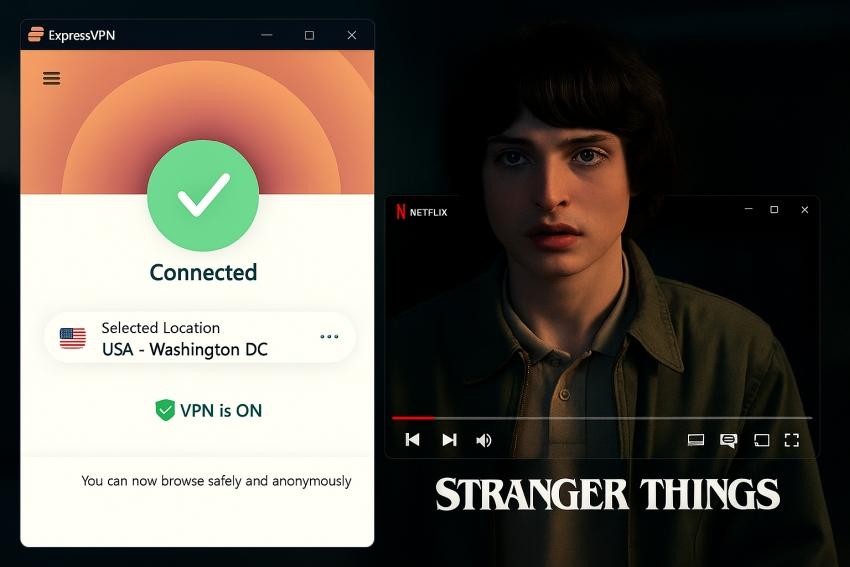
Torrenting and P2P
If you plan to use BitTorrent or other P2P services, ExpressVPN is an excellent option. Torrenting is allowed on all ExpressVPN servers with no restrictions. Some VPNs either forbid P2P or only allow it on specific servers, but with ExpressVPN we could fire up our torrent client on any server worldwide. We downloaded several large test files via torrent, and ExpressVPN's high speeds meant fast downloads - often maxing out our available bandwidth. There are a few key factors that make ExpressVPN great for torrenting, which we observed in practice: (1) Very fast speeds and low latency, so torrent transfers are quick; (2) No bandwidth limits, so you can download/upload as much as you need without throttling; (3) Strong privacy (zero logs, and with Network Lock kill-switch to prevent IP leaks if the VPN disconnects while torrenting). ExpressVPN does not offer port forwarding (a feature some VPN torrenters look for to potentially improve seeding connections), but we didn't find this to hinder our torrent performance in any noticeable way. In fact, ExpressVPN is listed among the top recommendations for torrenting due to its blend of speed and privacy. Throughout our P2P tests, our real IP remained hidden and we received no copyright notices, confirming that ExpressVPN effectively anonymizes torrent traffic.
Bypassing Censorship (China Test)
For users in restrictive internet environments like China or the Middle East, a VPN's ability to bypass censorship is crucial. We checked reports and spoke to users about ExpressVPN in China. The consensus is that ExpressVPN is one of the more reliable services for evading the Great Firewall. It employs obfuscated servers that disguise VPN traffic as regular HTTPS traffic, allowing it to get around China's VPN blocks. There are specific server locations recommended for China use (users can get this list from customer support, as the servers may change). While the Chinese government does occasionally manage to block ExpressVPN servers, the team responds quickly with fixes and new IPs. This cat-and-mouse game is true of any VPN in China, but ExpressVPN's longevity there speaks to its effectiveness. So if you are traveling to China or live under internet censorship, ExpressVPN is a solid choice to maintain access to the open internet.
Overview and Key Features
Company & Jurisdiction
ExpressVPN is based in the British Virgin Islands (BVI), a privacy-friendly jurisdiction outside of surveillance alliances. This location allows ExpressVPN to uphold a strict no-logs policy and provide anonymous service to users worldwide. In fact, independent audits and a real-world case (where Turkish authorities seized an ExpressVPN server and found no customer data) have bolstered trust in its no-logging claims.
Server Network
ExpressVPN's network is extensive, covering 105 countries with thousands of servers (over 3,000). This is one of the broadest networks in the industry, offering more server locations than most competitors. There are servers across Europe, the Americas, Asia-Pacific, Africa, and the Middle East, ensuring you can find a nearby server for optimal performance. The company has also been upgrading its infrastructure to use 10Gbps servers for higher throughput, reducing congestion and preparing for the demands of rising internet speeds (like 5G networks). All servers are run in RAM-only mode (ExpressVPN calls this the TrustedServer feature), meaning no data is stored on hard drives and any information on a server is wiped with each reboot. This RAM-disk approach provides an extra layer of security since it dramatically reduces the risk of any data persistence or leakage from servers.
Device Compatibility
One of ExpressVPN's strong suits is its wide device support and user-friendly apps. There are native ExpressVPN apps for Windows, macOS, Linux, Android, iOS, and even less-common platforms like Android TV, Fire TV, and Chromebook. For devices that don't support VPN apps (such as gaming consoles, some smart TVs, or Apple TV), ExpressVPN offers MediaStreamer (a smart DNS service) to still help unblock geo-restricted content on those devices. There are also browser extensions for Chrome, Firefox, and Edge - however, note that these work as a remote control for the main app (the extension won't run standalone without the desktop app). In our tests, the ExpressVPN applications were intuitive and polished on all platforms. The interface is clean and easy to navigate, with a big connect button and a simple server selector, making it accessible even to VPN newcomers.
Simultaneous Connections
A single ExpressVPN subscription allows you to connect up to 8 devices at the same time. This is an increase from the previous limit (5) and should be sufficient for most individual users with multiple devices. However, 8 connections can feel a bit tight if you have a family or many devices to protect. Competing services often offer more: for instance, Surfshark and IPVanish allow unlimited or very high numbers of devices, and even NordVPN (while allowing 6 simultaneous connections) comes at a lower price per account. If 8 isn't enough for you, there's a handy workaround - installing ExpressVPN on a router counts as only one connection, but will cover every device on your home network. ExpressVPN provides a dedicated router app and even sells a pre-configured "Aircove" VPN router with its software built-in. We found that setting up ExpressVPN on a router can effectively give your entire household VPN protection without worrying about the device limit.
Extra Features
Besides the basics, ExpressVPN packs several useful features:
Split Tunneling: Available on Windows, Mac, Android and routers, this lets you choose which apps or traffic go through the VPN and which go directly to the internet. We used this to allow certain trusted apps to bypass the VPN while protecting browser and P2P traffic through the encrypted tunnel - it worked reliably.
Threat Manager: This is ExpressVPN's built-in tracker and malware blocker, functioning at the DNS level to filter out domains known for ads, trackers, and malicious content. It's similar to an ad-blocking feature and is currently available on the Mac, iOS, and Linux apps (the Android and Windows versions don't have it yet). In our trials on macOS, Threat Manager successfully blocked a variety of tracking domains while we browsed. Keep in mind it only works when you're connected to the VPN (since it uses the VPN's DNS), but it's a welcome privacy feature for those platforms.
ExpressVPN Keys: ExpressVPN now includes a password manager (called "Keys") at no extra cost. We tested Keys on its mobile app - it can store unlimited passwords, credit card info, and secure notes, and offers conveniences like autofill and a password generator. Notably, Keys uses a zero-knowledge architecture and has undergone independent security audits, meaning your passwords are encrypted such that only you can access them. This addition makes ExpressVPN more of a one-stop privacy suite.
Parallel Connections: Under the hood, ExpressVPN uses a technology called Parallel Connections to establish the VPN connection faster. Essentially, the app will attempt multiple pathways (UDP, TCP, etc.) simultaneously and use whichever connects first, reducing connection time especially in restricted networks. This isn't something visible to users, but during our use the app consistently connected to servers in only a second or two, which is impressively quick.
No Dedicated IPs: One feature ExpressVPN doesn't offer is dedicated or static IP addresses. All IPs are shared among users for anonymity. If you specifically need a dedicated IP, you'd have to look at other VPN providers. ExpressVPN's view (which we share) is that shared IPs are better for privacy since your traffic blends with others.
User Experience and Ease of Use
ExpressVPN offers a very polished user experience. Here we cover our impressions using it on various devices and interactions with support.
Desktop App (Windows/Mac/Linux)
The desktop apps have a uniform design - a minimalistic window with a large power button to connect, and a location picker below it. In testing the Windows app (on Windows 11) and Mac app, we found them extremely easy to use. The interface is responsive and not cluttered with unnecessary options. A menu gives access to settings like protocol selection, Threat Manager toggle (on Mac), split tunneling setup, and account info. One thing we liked is how quickly the app connects/disconnects - thanks to Lightway, connecting to a server took only a second or two in most cases. The apps also have helpful touches like a search bar to quickly find server locations, and they display recent locations for quick reconnect. During our review period, we did not encounter any app crashes or serious bugs. The reliability and simplicity of ExpressVPN's software really stand out (in contrast, we've tested some rival VPN apps that were glitchy or confusing). It's clear that ExpressVPN puts effort into making the apps both secure and user-friendly, which can be critical for non-technical users.
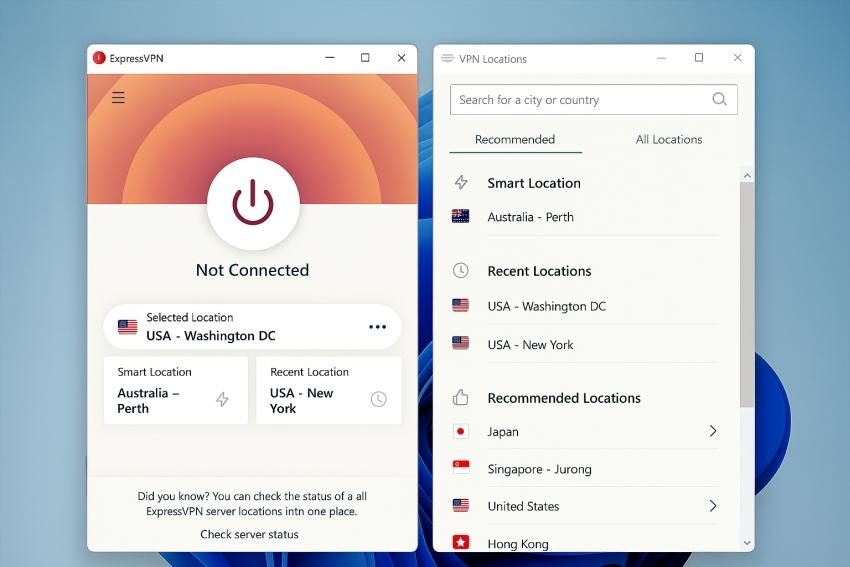
Mobile Apps (Android/iOS)
We also tested ExpressVPN on both Android (on a Samsung phone) and iPhone. The mobile apps closely mirror the desktop experience, with a big connect button and simple location list. Notably, Lightway protocol is fully available on mobile and it makes a huge difference - the connection stays stable even as the device switches networks (e.g., from WiFi to mobile data). This seamless handover is a big improvement over OpenVPN, which often would drop and reconnect when the network changed. We also noticed Lightway is very light on battery usage, a plus for phone users. On Android, you have both Lightway and OpenVPN options; on iOS, Lightway is available too. The Android app supports split tunneling as well, which we used to exclude a few apps from the VPN. Both mobile apps performed excellently - quick, stable, and easy enough that anyone could use them. If you need a VPN for your phone or tablet, ExpressVPN's mobile apps won't disappoint (and as noted, there's a 7-day free trial on mobile available to test it risk-free).
Browser Extensions
ExpressVPN's browser extensions for Chrome/Firefox (and now Edge) are a bit unique - they require the desktop app to be installed and running, as they basically function as a remote control for the app. The upside is that the extension can control the system-wide VPN and also add bonus privacy features (like WebRTC blocking and HTTPS Everywhere). The downside is you can't use the extension in isolation. If you were hoping to just secure browser traffic alone with a lightweight addon, you might be disappointed that it's tied to the main app. In our usage, the browser extension was convenient when we wanted to quickly switch VPN servers or locations without leaving the browser window. It's nicely integrated - for example, clicking the extension's icon shows a mini VPN interface. Just remember that it's not a separate connection from your main app.
Usability on Other Devices
We gave ExpressVPN a try on a Fire TV stick and on a router. On Fire TV (and similarly Android TV), ExpressVPN has a dedicated app which we downloaded from the app store. Streaming geo-blocked content (like Prime Video) through the Fire TV while connected to a VPN server worked perfectly, effectively unblocking content on the big screen. On routers, we flashed an ASUS router with ExpressVPN's custom firmware. The web interface provided by ExpressVPN for router management is fairly straightforward and allows for per-device VPN controls, which is quite powerful if you want certain devices always on VPN. We also appreciate that ExpressVPN sells the pre-flashed Aircove router with VPN ready to go - if you're not comfortable setting it up yourself, that's an easy (though somewhat pricey) way to cover your whole home. The Aircove's security was even audited by Cure53, which is an encouraging sign.
Overall Experience
Using ExpressVPN daily was a smooth experience. It runs quietly in the background when you don't need it, but it's fast to engage when you do. The reliability (no random disconnects) means you can leave it on without much worry. And features like auto-connect on startup or when joining an untrusted network add to the seamless protection. In short, ExpressVPN's maturity in the market shows - the apps feel refined and trustworthy.
Customer Support
Customer support is another area where a VPN service can be judged. ExpressVPN offers 24/7 live chat support, which we tested by asking a few questions at different times of day. Each time, we were connected to an agent within a minute and received helpful, polite responses. For example, we inquired about the best server for Netflix UK and the support rep immediately provided two recommended locations that are optimized for iPlayer and UK Netflix. The live chat is excellent for quick troubleshooting or account help.
ExpressVPN also has an email support and ticket system. To gauge that, we sent a query via email. The response came in roughly 48 hours, which is a bit slow. This aligns with other users' reports that email support isn't ExpressVPN's fastest channel. However, given the effective live chat, most users won't need to rely on email unless it's a complex issue that needs escalation.
The website houses a large number of support articles and tutorials as well. We found guides for setting up on various devices (including manual setups for things like gaming consoles using DNS or routers) that were detailed and up to date. If you prefer self-help, the knowledge base likely has answers to common questions. There's also a searchable troubleshooting section and even some video tutorials.
Overall, our impression of ExpressVPN's support is positive: live chat is the go-to and works around the clock, providing immediate assistance, whereas email is slower but eventually gets the job done. The only minor critique is the slower email response time, but that's mitigated by how good the live chat service is. Considering some VPNs outsource support or have very limited hours, ExpressVPN investing in 24/7 live support is a plus for users.
Pricing and Plans
ExpressVPN is often labeled as a premium-priced VPN, and our review of its pricing confirms that it is indeed on the higher end of the market. There is basically one plan (with all features included), available in multiple term lengths. The pricing at the time of writing is as follows:
Monthly Plan: $12.95 per month (billed monthly) - no discount, just pay-as-you-go.
12-Month Plan + 3 Months Free: $6.67 per month (billed $99.95 for the first 15 months). This brings the cost down by 48% compared to the monthly rate. After the initial 15 months, it renews annually at the normal annual price (which may be around $8.33/month if no discount).
24-Month Plan + 4 Months Free: $4.99 per month (billed $139.72 for 28 months up front). This is a 61% discount off the monthly rate and offers the best long-term value for ExpressVPN. Essentially, you get 2 years + 4 bonus months. Note: This 2-year option is a relatively new offering by ExpressVPN, introduced to stay competitive. Renewal pricing after that period might be higher (possibly around $8/month), but you'd be notified before renewal.
Even with these discounts, ExpressVPN's effective monthly cost on long-term plans (~$5) is still above many other VPNs. For comparison, a service like NordVPN or Surfshark can often be as low as $3-4 per month on a 2-year term. ExpressVPN is expensive, no way around it - you are paying a premium for its track record and features. The company justifies the price by pointing to its investments in network quality, security audits, and proprietary tech like Lightway. From our perspective, while it is pricey, many users find the reliability and performance worth the extra dollars. If budget is your top concern, there are cheaper alternatives that might suffice, but they may not match ExpressVPN's overall polish or trust level.
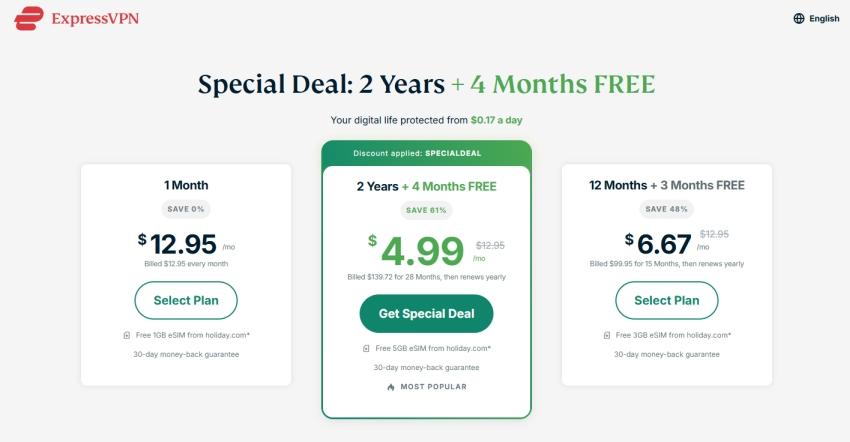
All plans come with a 30-day money-back guarantee, which is essentially a no-questions-asked refund policy. We have previously tested this refund process (in past years) and had no issues getting money back quickly after contacting support. Additionally, if you are on iOS or Android, ExpressVPN offers a 7-day free trial through the App Store/Play Store. We tried the mobile trial on an iPhone: you do have to enter payment details (through Apple/Google), but you won't be charged if you cancel before the week is up. It's a convenient way to test the service on mobile risk-free. Just note that the free trial is mobile-only; on other devices, the 30-day refund is your safety net to try it out.
ExpressVPN supports various payment methods: credit/debit cards, PayPal, Bitcoin (for those who want an extra layer of anonymity in purchase), and other options like WebMoney. The subscription includes all server locations and features (there are no tiers - e.g., you don't pay extra for more devices or anything; every plan is the same feature-wise).
Value for Money: We always ask, is it worth the price? In ExpressVPN's case, if you highly value streaming access, top-notch security, and hassle-free usage, the answer leans yes - it delivers a lot of value for the cost. However, casual users who just need a basic VPN for occasional use might find better value in a cheaper service. ExpressVPN is a premium VPN and is best for users who will take advantage of its premium capabilities. The good news is you can claim a refund in the first 30 days if you're not satisfied, so there's little risk in giving it a go even with the higher price tag.
Conclusion and Final Verdict
After extensive testing, our verdict is that ExpressVPN remains one of the top VPN services in 2025, living up to its reputation in most areas. It's a service that particularly shines for privacy-conscious users, frequent streamers, and those who demand high performance. Here's a summary of our key findings and impressions:
Strong Privacy & Security: ExpressVPN operates from a safe offshore jurisdiction (BVI) and has solid policies to protect user data (no logs, RAM-only servers). All security features - encryption, kill switch, leak protection - worked flawlessly in our tests. We felt very confident in the security of the connection at all times.
Excellent for Streaming: This VPN consistently unblocks Netflix (multiple regions) and many other streaming services like Disney+, Hulu, BBC iPlayer, Amazon Prime Video, and more. If streaming content from around the world is your goal, ExpressVPN is a reliable choice that proved effective with no buffering issues.
User-Friendly Apps on Many Platforms: ExpressVPN offers a huge selection of apps that are well-designed, stable, and easy to use. Whether on desktop, mobile, or TV devices, we found the experience smooth. The apps include advanced features but keep the interface simple - suitable for both tech-savvy users and VPN beginners.
Fast and Consistent Speeds: The Lightway protocol and high-quality server network give ExpressVPN a performance edge. We experienced fast speeds across all regions tested, with minimal impact on our baseline connection. It's among the fastest VPNs we've reviewed. While NordVPN was slightly faster in certain benchmarks, ExpressVPN is not far behind and will comfortably handle data-intensive tasks.
Reliable and Secure Infrastructure: All servers running in RAM (TrustedServer) means enhanced security and no lingering data on servers. Additionally, features like Threat Manager add extra protection against trackers. ExpressVPN appears to cut no corners in protecting users' data and has undergone audits to prove it.
Good Customer Support: With 24/7 live chat and a 30-day money-back guarantee, customer service is a strong point. Any issues or questions we had were resolved quickly by their support team during our review.
Drawbacks: On the flip side, a few cons are worth noting. ExpressVPN allows only 8 simultaneous connections, which, while an improvement over 5, might not be ideal for a large family's myriad devices. Some cheaper VPNs offer more connections per account. Also, it's one of the more expensive VPNs on the market. If you're on a tight budget, the cost may give you pause, even though the quality is high. We'd also mention that ExpressVPN doesn't have some niche features that certain competitors do - for example, it lacks multi-hop (double VPN) or ad-blocking on Windows (its Threat Manager is not yet on Windows), whereas NordVPN includes those features. These aren't deal-breakers for most users, but they are areas where alternatives like NordVPN or Surfshark sometimes gain an edge. In fact, in direct comparisons, NordVPN often comes out slightly ahead due to offering a bit more for a bit less cost. NordVPN matches many of ExpressVPN's strengths (including also using RAM-only servers and strong encryption) and adds features like Double VPN, and generally NordVPN's long-term pricing is cheaper. So, while ExpressVPN is superb, NordVPN is arguably a tad better overall in value and speeds - a point to consider if you're choosing between the two.
Final Word: ExpressVPN is a premium service and it largely justifies that status. Throughout our hands-on testing, ExpressVPN proved to be secure, fast, and versatile. It's a VPN that we can comfortably recommend for all types of users - whether you're a tech-savvy user who will utilize the advanced features and broad device support, or an average user who just wants a reliable, easy solution for privacy and streaming. If the price is within your budget, you'll be getting a top-notch VPN service that is unlikely to disappoint. ExpressVPN truly appears to be "worth the price" for the quality and peace of mind it delivers.
For those interested in trying it out, remember the 30-day money-back guarantee means you can test all these features yourself and claim a refund if it doesn't meet your expectations. But based on our extensive tests, ExpressVPN passed with flying colors in nearly every category, making it one of the best VPN choices in 2025 for users who demand security, speed, and reliability.
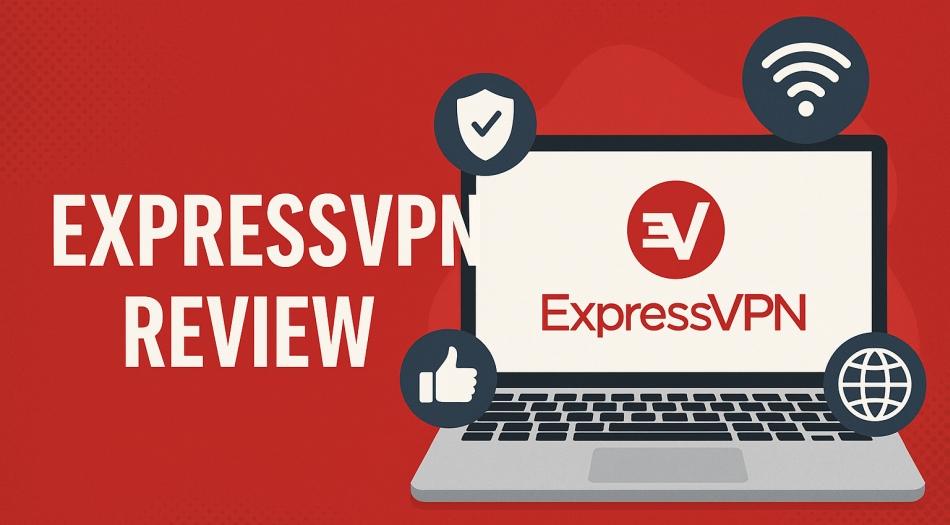
 John Moore is a seasoned IT security consultant and tech writer with over a decade of experience in cybersecurity, privacy tools, and VPN technologies. With a background in computer science and a passion for digital freedom, he regularly tests and reviews VPN services, focusing on real-world usability, performance, and privacy protection.
John Moore is a seasoned IT security consultant and tech writer with over a decade of experience in cybersecurity, privacy tools, and VPN technologies. With a background in computer science and a passion for digital freedom, he regularly tests and reviews VPN services, focusing on real-world usability, performance, and privacy protection. Mike Hall is a privacy advocate and technology analyst specializing in internet security, VPNs, and digital rights. With years of hands-on experience testing VPN providers and researching online censorship, Mike provides readers with practical insights into secure browsing, data protection, and bypassing geo-restrictions.
Mike Hall is a privacy advocate and technology analyst specializing in internet security, VPNs, and digital rights. With years of hands-on experience testing VPN providers and researching online censorship, Mike provides readers with practical insights into secure browsing, data protection, and bypassing geo-restrictions.